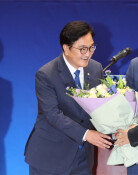Seoul should strengthen relations with Beijing to press Pyongyang
Seoul should strengthen relations with Beijing to press Pyongyang
Posted May. 28, 2013 06:29,
Following an official revealing of its intention to resume the six-party talks through its special envoy Choe Ryong Hae who delivered the message to Chinese President Xi Jinping, North Korea once again declared on Monday its goal to develop both nuclear program and economy at the same time. (South Korea) does not understand the strategic greatness of the co-development plan, said the Stalinist regime in its statement refuting President Park Geun-hyes remarks that the Norths plan to strengthen the economy while developing nuclear weapons would not succeed.
Pyongyangs rejection of denuclearization did not come out of the blue. Despite pressure from Chinese leadership including President Xi on the Norths special envoy Choe, North Korea did not mention a word about denuclearization. Pyongyangs promise to have a dialogue with related countries for the peace and security on the Korean Peninsula is not trustworthy.
Against this backdrop, experts say North Koreas mentioning of the six-party talks is to buy out time for building nuclear weapons. Conditions to resume the six-party talks are not likely to be met, which include a moratorium on nuclear tests and missile launch, stopping of uranium enrichment and IAEA investigation. Foreign Affairs Minister Yoon Byeong-se urged North Korea to prove its will to denuclearize, by saying, A mere singing of a bird doesnt help a flower bloom.
While rejecting the Souths request for a bilateral meeting to take finished goods and raw materials at the Kaesong Industrial Complex, the North tried to incite internal conflicts in the South by inviting South Koreans to a commemoration ceremony of the June 15 Joint Declaration in Kaesong or the area near Mt. Kumgang. Pyongyang has tried to have direct communication with South Koreans by sending faxes to South Koreans who own plants in the Kaesong complex while estranging the South Korean government.
Seoul should not allow its citizens to attend the celebration of the June 15 Joint Declaration, which Pyongyang seeks to use as a political propaganda, unless the North provides the South with a ground to trust it by accepting negotiations regarding the Kaesong Industrial Complex. The Unification Ministry said Monday in a statement read by a spokesperson, North Koreas attitude is not trustworthy and just a repeat of its previous attempt to instigate internal conflicts in South Korea. The main opposition Democratic Party and its leader Kim Han-gil also criticized that Pyongyangs denouncing President Park Geun-hye was seriously wrong.
North Koreas gesture to come to a negotiation table in the past was the result of international collaboration on responding to North Koreas provocations, but Pyongyang has not changed its mind. Therefore, the international community should further press North Korea based on a common goal of the denuclearization of the North. China and the U.S. should take the lead in this attempt, while Korea, Japan and Russia should support the efforts. China is the only country that still can exert influence on North Korea. Taking President Parks official visit to China as an opportunity, South Korea should strengthen its diplomatic relations with China to consolidate influences on the North.







